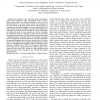Free Online Productivity Tools
i2Speak
i2Symbol
i2OCR
iTex2Img
iWeb2Print
iWeb2Shot
i2Type
iPdf2Split
iPdf2Merge
i2Bopomofo
i2Arabic
i2Style
i2Image
i2PDF
iLatex2Rtf
Sci2ools
123
click to vote
INFOCOM
2003
IEEE
2003
IEEE
Cooperation in Wireless Ad Hoc Networks
— In wireless ad hoc networks, nodes communicate with far off destinations using intermediate nodes as relays. Since wireless nodes are energy constrained, it may not be in the best interest of a node to always accept relay requests. On the other hand, if all nodes decide not to expend energy in relaying, then network throughput will drop dramatically. Both these extreme scenarios (complete cooperation and complete noncooperation) are inimical to the interests of a user. In this paper we address the issue of user cooperation in ad hoc networks. We assume that nodes are rational, i.e., their actions are strictly determined by self interest, and that each node is associated with a minimum lifetime constraint. Given these lifetime constraints and the assumption of rational behavior, we are able to determine the optimal throughput that each node should receive. We define this to be the rational Pareto optimal operating point. We then propose a distributed and scalable acceptance algorit...
Ad Hoc Networks | Communications | INFOCOM 2003 | Optimal Operating Point | Wireless Ad Hoc Networks |
Related Content
| Added | 04 Jul 2010 |
| Updated | 04 Jul 2010 |
| Type | Conference |
| Year | 2003 |
| Where | INFOCOM |
| Authors | Vikram Srinivasan, Pavan Nuggehalli, Carla-Fabiana Chiasserini, Ramesh R. Rao |
Comments (0)

